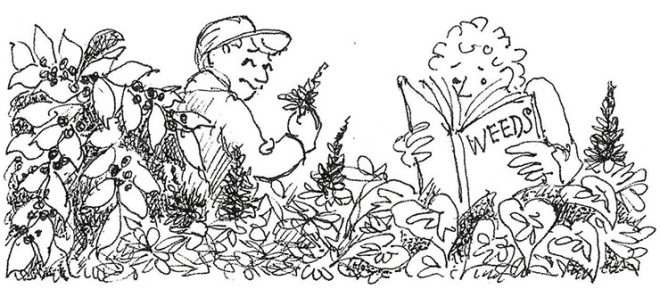Do you love any flowers that are weeds? There’s a large plot in our yard that, when we first moved in, I was determined to turn into a whimsical, easy-to-care for cottage garden with stepping stones going through it, and flowers my daughter could cut and assemble for her many outdoor projects. Feeling a bit lazy and wanting a quick fix, I decided I’d litter the designated area with native perennial wildflower seeds. As a result, our plot is now full of mixed tall and dainty little wildflowers of all colors and sizes—it’s absolutely beautiful!
The thing is, wildflowers are called “wild” for a reason. Without regular maintenance, they can quickly take over the garden just like a weed and get a little haggard in their off-seasons. Fortunately, I have been on top of pulling out weeds, and deadheading spent blooms, but my “lazy” approach turned out to be much bigger task than if I had chosen bulbs with plants that take up more room. Here I thought they’d eventually replicate enough to choke out the weeds, but in the end, I ended up with a beautiful weed/flower garden. Luckily it’s along the back of my yard, so like the Mona Lisa, it’s best viewed from a distance.
The author of today’s story, “If a Plant is Growing Well…” took the advice of an “expert” and planted an absolutely wonderful bird hedge along the eastern edge of their Illinois yard, which turned out to include wildly invasive Autumn olives and bush honeysuckle. Also, his ‘Morden’s Pink’ lythrum was found to be helping pollinate purple loose-strife, so it had to be removed. The chameleon plant was another choice that proved difficult, as it tunnels under sidewalks and thrives in cold or heat. What he learned is that Murphy’s Law of Gardening applies here: if a plant is growing well for you, then it may not have been a wise choice in the first place!
Enjoy More Gardening Mishaps
This story comes from our archive that spans over 30 years, and includes more than 130 magazine issues of GreenPrints. Pieces like these that turn stories of gardening mishaps into everyday life lessons always brighten up my day, and I hope this story does for you as well. Enjoy!

“If a Plant is Growing Well…”
By Nell Prince

My personal gardening failures seem to center around choosing unwisely. But it’s not my fault! Well, kinda not…
Upon the recommendations of various experts who wrote about planting for wildlife, I put in an absolutely wonderful bird hedge along the entire eastern edge of our Illinois yard. The flowers are fragrant, the plants filled in quickly and thrived—the idea actually worked as planned! We’re talking at least 160 feet of…
…Autumn olives and bush honeysuckle.
You’re groaning now. Not as much as I am, the chump who has to take out all those wildly invasive plants.
Then there was the delightful—and sterile—‘Morden’s Pink’ lythrum. Sterile, but, it turns it that it helps pollinate purple loose-strife, which is choking all our wetlands! Out came those beauties.
Colorful chameleon plant (Houttuynia cordota), a lovely ground-cover I planted? It tunnels under sidewalks and thrives in cold or heat!
It strikes me as ironic that of the plants that don’t accidentally die by my hands, some have to be slain by me, their mother and nurturer, who paid for them and spent precious time and energy caring for them.
Could this be Murphy’s Law of Gardening: “If a plant is growing well for you, it’s probably a plant you shouldn’t be growing at all”? ❖
By Nell Prince, published originally in 2020, in GreenPrints Issue #124. Illustrated by Marilynne Roach

What are your favorite flowers that are weeds? Leave a comment and share it with us!


